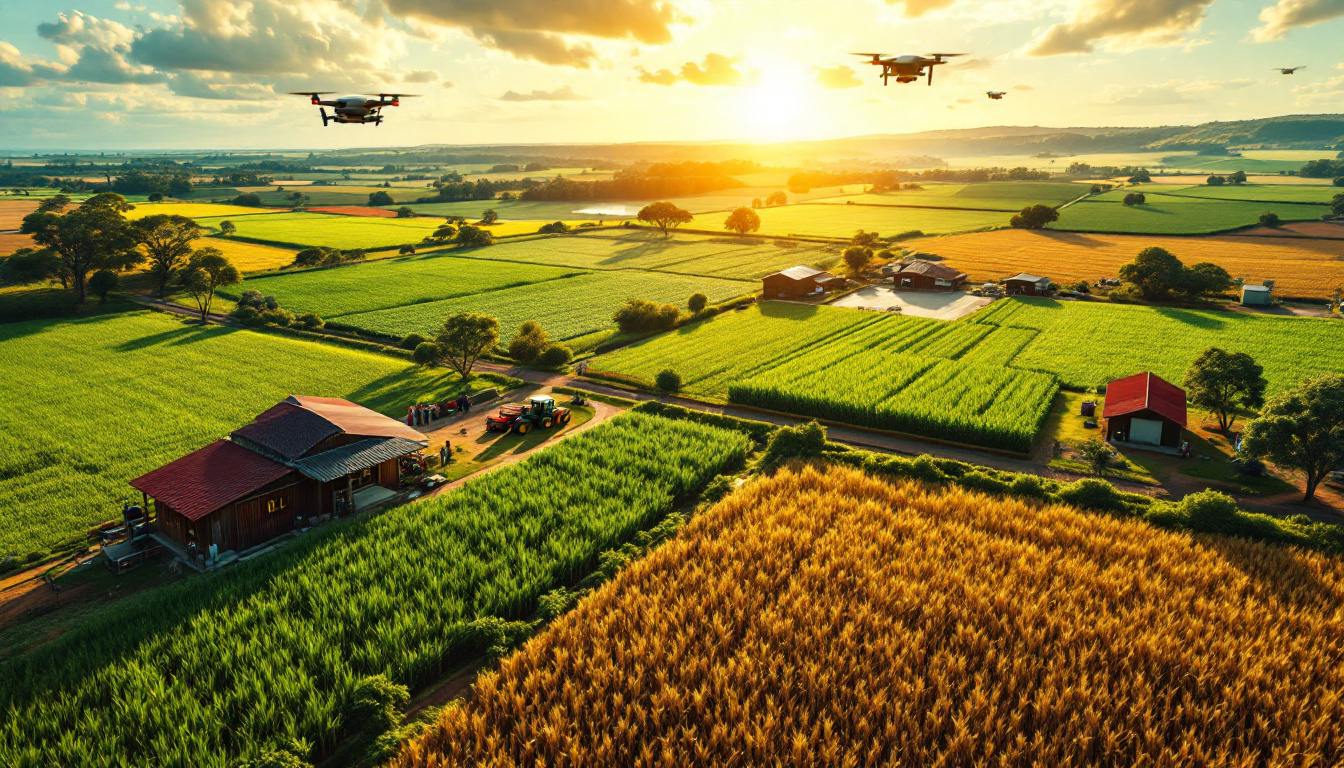RLF Agtech Ltd
- ASX Code: RLF
- Market Cap: $75.2M
- Shares on Issue (SOI): 156M
- Cash: $0M (latest update not provided)
- Enterprise Value (EV): $75.2M
RLF Agtech Ltd's Strategic Partnership with NRI: A Game Changer for Australian Agriculture
RLF Agtech Ltd has recently signed a significant Trading Agreement with National Rural Independent Ltd (NRI), marking a pivotal moment in the company's expansion within the Australian agricultural sector. This partnership not only amplifies RLF's market presence but also aligns with the broader goals of enhancing productivity and sustainability in farming practices across the country.
Why is the Trading Agreement with NRI Important?
The agreement with NRI is crucial for several reasons. NRI's extensive network, comprising 152 rural stores nationwide, provides RLF with unparalleled access to Australian farmers. This expansive reach facilitates the distribution of RLF's innovative agricultural technologies directly to those who can benefit most.
Key aspects of the agreement include:
- Expanded Market Reach: NRI's stores are strategically located in prominent agricultural regions, enabling RLF to connect with a wide array of farmers.
- Immediate Revenue Potential: The increased product distribution is anticipated to bolster RLF's revenues, improving the company's financial outlook.
- Brand Credibility: Collaborating with a respected organisation like NRI enhances RLF's reputation among Australian farmers.
- Sustainability Impact: The partnership supports farmers in boosting yields while adopting environmentally friendly methods, contributing to national sustainability initiatives.
By leveraging NRI's established relationships and infrastructure, RLF is poised to make significant strides in a competitive industry, offering tangible benefits to both farmers and stakeholders.
What Makes the NRI Agreement Unique in Agriculture?
This Trading Agreement transcends a typical distribution deal by fostering a collaborative model rooted in shared values and goals. NRI’s longstanding presence in rural areas and in-depth understanding of local conditions give this partnership a strategic edge.
Key benefits to RLF from this agreement include:
- Efficient Distribution Systems: Utilising NRI’s robust logistics infrastructure allows RLF to deliver products more efficiently, reducing lead times and improving customer satisfaction.
- Expertise in Farming Practices: RLF gains access to NRI’s wealth of knowledge in agronomy and rural sales, enhancing its ability to address farmers' specific needs.
- Enhanced Farmer Relationships: Through NRI’s deep connections within rural communities, RLF can better understand and respond to on-the-ground challenges faced by growers.
This synergy not only strengthens RLF's service offerings but also supports farmers in adopting advanced agricultural solutions that are both effective and sustainable.
The Role of RLF's Technology in Addressing Agricultural Needs
RLF Agtech's commitment to innovation is evident in its cutting-edge technologies designed to tackle critical issues in modern agriculture, such as enhancing productivity and promoting environmental sustainability.
- Plant Proton Delivery Technology (PPDT)
This advanced nutrient delivery system enhances crop efficiency by improving nutrient absorption at the cellular level. By utilising PPDT, crops become more productive and nutrient-rich, meeting the growing demand for high-quality produce. It also enables farmers to optimise fertiliser use, reducing costs and environmental impact.
- Accumulating Carbon in Soil System (ACSS)
ACSS is a groundbreaking approach that captures atmospheric carbon and stores it in the soil, increasing soil organic matter. This process not only improves soil health and fertility but also contributes to carbon sequestration efforts, helping to mitigate climate change.
These technologies allow RLF to address global challenges such as food security and environmental degradation. For farmers, the benefits are immediate and practical: increased yields, improved crop quality, and a reduced environmental footprint.
Aligning with the Global Shift Toward Sustainable Practices
The agricultural sector is experiencing a paradigm shift towards sustainability, driven by consumer demand and regulatory pressures. Similar to the Australian mining industry's green transformation, RLF's technologies position the company at the forefront of this movement, offering solutions that promote efficient resource use and environmental stewardship.
Moreover, advancements in green technologies, such as platinum's crucial role in boosting the green hydrogen revolution, highlight the interconnectedness of different sectors in the global push towards sustainability. By integrating sustainable practices, RLF contributes to a larger ecosystem working towards environmental conservation.
Growth Potential in the Australian Market
The agreement with NRI significantly accelerates RLF's efforts to capture a larger share of the Australian market. The company's strategic moves, such as the acquisition of LiquaForce, have already laid a strong foundation.
Key milestones include:
- LiquaForce Acquisition: This move provided RLF with local manufacturing and distribution capabilities, enhancing operational efficiency.
- Proven Track Record: Since 2006, RLF has successfully operated across Asia, demonstrating its ability to scale and adapt in established markets.
- Sustainability Commitment: Aligning with Australia's focus on sustainable agriculture, RLF's products meet the evolving needs of the market.
Through NRI's network, RLF can introduce its portfolio of advanced products to a broader audience, ensuring that Australian farmers have access to high-performing, sustainable solutions.
Leveraging China's Economic Influence on Australian Resources
While expanding domestically, RLF also recognises the impact of global economic dynamics on the Australian agricultural sector. For instance, China's economic stimulus initiatives have influenced demand for Australian resources, including agricultural products. Additionally, the surge in iron ore prices due to China's stimulus hopes reflects broader market trends that can indirectly affect agricultural investments and commodity prices. Understanding these market dynamics is essential for RLF to strategise effectively.
By staying attuned to international trends, RLF can position itself to capitalise on opportunities arising from shifts in demand and trade relations.
Embracing Technological Innovation and Resource Management
RLF's commitment to technological innovation extends beyond agriculture into the broader context of resource management. Understanding the fundamental aspects of natural resources, as explored in studies like the geology of ore deposits, provides valuable insights into sustainable extraction and utilisation practices. By adopting a scientific approach to resource management, RLF ensures that its products not only enhance agricultural productivity but also promote responsible stewardship of the environment.
Investment Outlook for RLF
The convergence of innovative technology, strategic partnerships, and a focus on sustainability makes RLF an attractive prospect for investors.
Reasons why this is an opportune time to consider RLF include:
- Growing Market Demand: There is an increasing need for sustainable agricultural solutions that do not compromise on productivity.
- Technological Edge: RLF's proprietary technologies provide a competitive advantage in the market.
- Strategic Partnerships: Agreements like the one with NRI showcase RLF's ability to execute thoughtful expansion plans.
- Sustainability Profitability: The company's products align profitability with environmental responsibility, appealing to a broad range of stakeholders.
Additionally, as the Australian mining industry's green transformation progresses, there is a ripple effect on sectors like agriculture. RLF's focus on sustainable practices positions it to benefit from this broader shift.
Conclusion
The Trading Agreement with NRI represents a significant milestone for RLF Agtech Ltd. By tapping into NRI's established infrastructure and deep-rooted relationships, RLF is set to enhance its market share and engage more effectively with farmers across Australia.
The integration of innovative technologies like PPDT and ACSS underscores RLF's dual commitment to productivity and sustainability. These advancements address critical challenges in agriculture, offering farmers solutions that improve yields and support environmental goals.
With a clear operational plan and strategic initiatives like the NRI agreement, RLF Agtech Ltd is well-positioned for long-term growth. For stakeholders and observers within the agricultural sector, RLF's progress is a development worth monitoring closely.
Ready to Transform Your Agricultural Investment Strategy?
Discover how Discovery Alert can provide you with cutting-edge insights into innovative agricultural technologies and investment opportunities, just like RLF Agtech's groundbreaking solutions. Start your 30-day free trial today and gain access to real-time alerts that help you stay ahead of emerging trends in sustainable agriculture and market-moving developments.







